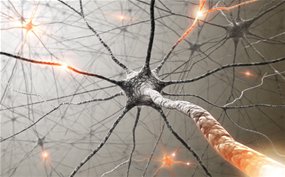About Artificial Neurons and the Neuro Interface
While reading News in Science, I came across some interesting information about the development of a Japanese scientist. He plans in the near future to create nanoscale devices that can control neurons in the human brain. This article is partly a free translation of the article “Nanotechnology may tap into your mind”, but to a large extent complements and reveals the possible applications of this technology, and here I also tried to accumulate various achievements related to this type of development.

Speaking at a recent Sydney conference, Keiichi Torimitsu said that “Establishing a connection between the brain and electronics is important for further understanding how the brain works and for gaining control over the activity of neurons. Our ultimate goal is to create devices that can read information from the brain and transfer it to a computer. ” Although it is quite difficult to believe in the possibility of this at the moment, the appearance of such devices may become a new word in the development of treatment for various neurological diseases, such as, for example, paralysis. Also, over time, such studies can lead to the creation of organs responsible for various senses (the appearance of artificial eyes and ears).
The device that they plan to create will include a nanoscale electrode coated with a membrane resembling a living cell membrane, including containing receptor proteins that most actively affect the activity of a neuron. Artificial neurons will allow you to examine the signals transmitted in the brain to the computer and return the changed ones.

Currently, Harvard scientists under the leadership of Charles Lieber are conducting studies on the supply of electrical neurons to individual brain neurons. "We created the first artificial synapse, our device can stimulate or suppress the propagation of signals along axons in the human brain." Now a group of Professor Liber is working on the study of neurotransmitters - chemicals that transmit information between neurons. To this end, scientists have connected artificial synapses to a neural network consisting of several living neurons.

Attention also deserves the development of German scientists from Tübingen - a headgear with which a paralyzed person can use a computer: type text, surf the Internet. The device is imperfect - it takes a long time for it to learn correctly to recognize the owner’s mental commands by trial and error, but the final result of the prototypes is already encouraging for the future of such a manipulator. I recall one of the House series where a similar device has already been used :)
What to read on the topic:
1. News in Science
2. Popular mechanics

Speaking at a recent Sydney conference, Keiichi Torimitsu said that “Establishing a connection between the brain and electronics is important for further understanding how the brain works and for gaining control over the activity of neurons. Our ultimate goal is to create devices that can read information from the brain and transfer it to a computer. ” Although it is quite difficult to believe in the possibility of this at the moment, the appearance of such devices may become a new word in the development of treatment for various neurological diseases, such as, for example, paralysis. Also, over time, such studies can lead to the creation of organs responsible for various senses (the appearance of artificial eyes and ears).
The device that they plan to create will include a nanoscale electrode coated with a membrane resembling a living cell membrane, including containing receptor proteins that most actively affect the activity of a neuron. Artificial neurons will allow you to examine the signals transmitted in the brain to the computer and return the changed ones.

Currently, Harvard scientists under the leadership of Charles Lieber are conducting studies on the supply of electrical neurons to individual brain neurons. "We created the first artificial synapse, our device can stimulate or suppress the propagation of signals along axons in the human brain." Now a group of Professor Liber is working on the study of neurotransmitters - chemicals that transmit information between neurons. To this end, scientists have connected artificial synapses to a neural network consisting of several living neurons.

Attention also deserves the development of German scientists from Tübingen - a headgear with which a paralyzed person can use a computer: type text, surf the Internet. The device is imperfect - it takes a long time for it to learn correctly to recognize the owner’s mental commands by trial and error, but the final result of the prototypes is already encouraging for the future of such a manipulator. I recall one of the House series where a similar device has already been used :)
What to read on the topic:
1. News in Science
2. Popular mechanics
